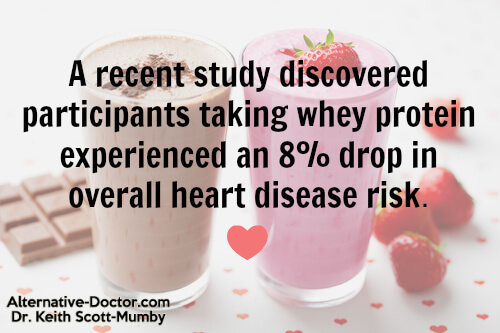Globally, heart disease claims the lives of more than 17.3 million people. This single number represents more than 31% of all deaths from all causes on the entire planet.
It’s staggering to understand that almost one-third of all deaths (for both men and women) are due to hearts that stop working for one reason or another.
To say your heart health must be your primary concern (at every age) is an understatement. To ignore your heart health (as most do) is a recipe for disaster.
While the mainstream medical community and health organizations often get the particulars of heart disease wrong (stop putting all the blame on cholesterol!), there are a few heart disease risks we all agree are damaging your cardiovascular system one cell at a time.
Top 5 Heart Disease Risk Factors
- Poor diet
- Lack of exercise
- Smoking
- Excess alcohol consumption
- Obesity
These are the five big ones. The ones that raise your heart disease risk by leaps and bounds. First and foremost, these habits cause massive inflammation throughout your body. You already know that inflammation is the root cause of all major diseases and conditions.
Macronutrients Essential to Your DNA
Protein, fats, and carbohydrates are the three macronutrients you require to live. You cannot survive without the calories and energy they provide to fuel you on the cellular level and keep your body’s systems running.
I’ve talked extensively about healthy fats and carbohydrates but today, I’m going to focus on the power of the third macronutrient.
You must increase your intake of protein.
This is a choice for your health that you can make right now. It’s critical that you get this simple and highly effective essential macronutrient into your body. Experts estimate this single substance makes up more than 15% of your total body weight.
According to the National Institutes of Health, “Protein is composed of amino acids (compounds made of carbon, hydrogen, nitrogen, oxygen, or sulfur). Amino acids are the building blocks of proteins, and proteins are the building blocks of muscle.”
Your muscles, your metabolism, fail without enough protein. It fills you up with fuel your body uses in its entirety – wasting nothing.

The 9 Best Food Sources of Protein
- Pure whey protein
- Greek yogurt, cottage cheese, and Swiss cheese
- Eggs (one of my personal favorites)
- Beef, pork, chicken, and turkey
- Tuna, halibut, salmon, and tilapia
- Canned anchovies or sardines
- Beans, legumes, and nuts
- Peanut butter
- Wheat germ or quinoa
Unfortunately, the standard diets of developed countries mean we don’t take in enough pure protein. We negate the benefits of many protein-rich foods by the way they’re grown, processed, and prepared in our kitchens.
You need to keep the process simple to ensure you’re getting what your body needs consistently – not just when the perfect storm comes together in the occasional meal.
The Value (and Convenience) of Pure Whey Protein
In a study published in The American Journal of Clinical Nutrition, researchers from several national health agencies found that whey protein directly affects heart disease risk. “Whey protein lowers blood pressure and improves endothelial [lining of your blood and lymphatic vessels] function and lipid biomarkers in adults with hypertension.”
Whey protein is the clear liquid that separates from cow milk during the manufacturing of cheese. It’s considered a “complete” protein because it provides the right balance of all nine essential amino acids your body requires.

Benefits of Whey
- Highly digestible
- Necessary for muscle growth and maintenance
- Lowers heart disease risk
- Stimulates glutathione production (used in every cell in your body)
- Moderates blood sugar
- Reduces inflammation
- Regulates low-density (LDL) cholesterol
- Filling and beneficial to your weight loss goals
University of Reading (UK) researchers discovered their participants taking whey protein experienced an 8% drop in overall heart disease risk.
One of the study’s authors, Professor Ian Givens, explained, “By giving people a high dose of whey protein, similar to the amount used by athletes, we were able to see a significant impact over an eight-week trial.”
Getting Complete Nutrition Has Never Been Easier!
Scientists used to think you couldn’t do anything to change the genetics you were born with. The study of nutrigenomics has shown researchers that your genes are similar to light switches.
“Bad” genes are in the “off” position. These can contribute to things like low energy or difficulty losing weight. You can turn them on with the right nutrients!
It’s more than the sporadic “good for you” meal that includes a brilliant salad. Choosing to eat kale now and again isn’t going to give you consistent results.
You need a very specific blend of nutrients. Something you can consume each and every day to provide your body with the combination of good stuff it really requires.
Dr. Keith’s Own® Protein Meal Replacement Shake helps you put your pro-protein plan to lower heart disease risk into action!
- No synthetic ingredients
- Zero sugar
- Quality healthy fats
- 400% more fiber than similar shakes
- 20 grams per serving of highest quality whey protein available
- Digestive enzymes and probiotics
- No growth hormones, antibiotics, or other impurities
- No lactose or casein
- Packed with vitamins A, Bs, C, D, E, K, calcium, chromium, folic acid, iron, potassium, magnesium, and more!
Even if you’re not trying to lose weight or become a bodybuilder, making these incredible shakes part of your daily routine is one of the best (and easiest) things you can do for your health.
Imagine tossing a scoop of sweet chocolate cream into a strawberry-banana smoothie in the morning. The decadent flavors will make it feel like dessert but your body will easily digest, absorb, and use all the powerful compounds.
You’re going to feel amazing.
Your body needs protein to live. Your risk of heart disease drops with pure protein consumption. Here’s a simple and highly effective way to look better, feel younger, and live longer.
The post Reduce Your Risk of Heart Disease with Protein appeared first on Dr. Keith Scott-Mumby.
